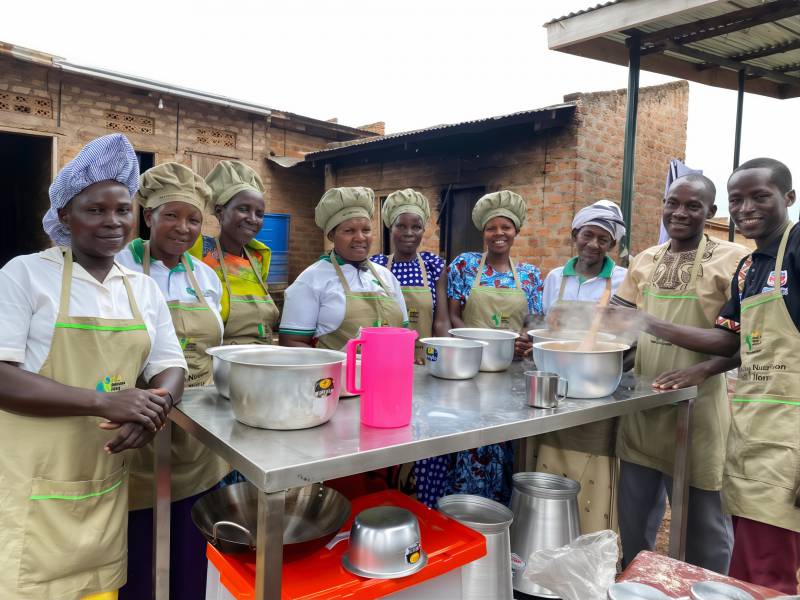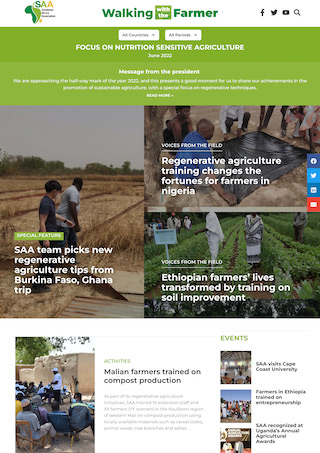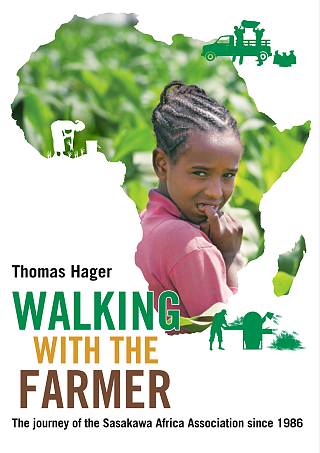Empowering Communities Through Nutrition and Gender Awareness in Uganda

Nutrition and food security continue to be critical issues for rural communities in Uganda, where malnutrition and stunting rates are alarmingly high. According to the Global Nutrition Report 2021, 28.9% of children under five in Uganda are stunted, 3.5% are wasting, and 32.8% of women of reproductive age are anemic. SAA's interventions could be more timely in integrating nutrition education with agricultural practices. Nutrition training sessions were recently held at One-stop Nutrition Model homes (OS-NMH) in Isingiro, Rakai, Mubende, Otuke, and Kole (Okwerodot and Alito sub-counties) districts from 30th Sept to 11th Oct 2024. The training sessions focused on promoting healthy dietary practices while addressing gender roles that influence household nutrition and decision-making to reduce the prevalence of malnutrition in these communities.
The OS-NMH program aligns with SAA's broader strategy of using Nutrition-Sensitive Agriculture to improve Household Dietary Diversity Scores and reduce stunting rates in children under five. The OS-NMH, serve as centers of learning and practice for nutrition and skills to improve incomes through the value addition of nutrient-dense foods. These homes demonstrate best practices in cultivating nutrient-dense crops and food preparation, focusing on child feeding of all age groups, caregiving, sanitation and hygiene, rainwater harvesting, livestock keeping, food safety and preservation, and training hub for composite flour processing for business. In Health, the homes provide preventive, promotive, referral, and follow-up care, building awareness about nutrition and preventive health in collaboration with child and women's welfare, health, and education departments.
During the training sessions, participants were taught how to grow and prepare a diverse range of nutrient-dense foods, using locally available resources. "The training helped us realize how important it is to include more vegetables and legumes in our meals," said Hajjara Namuddu, one of the participants from Isingiro. "We are now growing our own gardens and ensuring our children eat balanced diets."
As part of the practical demonstrations, participants learned simple techniques to create nutritious meals that address malnutrition challenges in rural communities. Also, the NSA team emphasized creating a business that makes nutritious composite flours and sells them to community members. They calculated the start-up capital of 110 USD for making 100kg of the composite flours. The estimated price for 1kg is 1.2 USD, which can be affordable for the community members.
The training also included a vital component of gender awareness. The NSA team guided participants through discussions on the impacts of traditional gender roles on household food security. The sessions promoted the idea of shared responsibilities in farming, food preparation, family nutrition, and income. "For too long, women have been expected to bear all the responsibilities of feeding the family," noted John Ntimba, a participant from Rakai. "This training opened my eyes to how we can support our wives and share these tasks equally."
These discussions helped both men and women understand how gender inequalities affect family well-being and how more equitable involvement can lead to better nutritional outcomes for all.
 SAA’s DCD Mr Joseph Bbemba delivering a speech on nutrition awareness at the Rakai Nutrition Model Home.
SAA’s DCD Mr Joseph Bbemba delivering a speech on nutrition awareness at the Rakai Nutrition Model Home."We are not just changing diets; we are changing mindsets," says Mr Joseph Bbemba, SAA's Deputy Country Director for Uganda. "At the One-stop Nutrition Model Home, neighboring families are invited to attend the training and copy the good practices to improve their nutritional statuses. When women and men are empowered with knowledge and resources, entire communities thrive," added Jacqueline Namusalisi, NSA Technical Coordinator.
In conclusion, SAA's OS-NMH initiative enhances nutrition and food security in Uganda's rural communities by integrating practical nutrition education with sustainable agricultural practices. It promotes gender awareness, shared responsibility, and long-term positive change in rural areas.
Related media featured article: "How Model Homes Are Tackling Malnutrition in Rural Communities"
SAA Publications

E-newsletter
"Walking with the Farmer"
SAA publishes a bimonthly e-newsletter reporting on SAA activities.

SAA history book
"Walking with the Farmer: The journey of the Sasakawa Africa Assoication since 1986"
This book chronicles the history of SAA from its inception to the present.

Annual Report
Annual Report FY2023
Annual Report FY2023 is available here.





